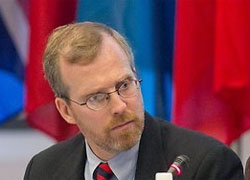Outpost of Tyranny
6- By David J. Kramer, Christopher Walker, «Foreign Policy»
- 30.06.2011, 9:36

The conditions that created the Arab Spring are just as present in the former Soviet Union.
Hillary Clinton had it right two weeks ago when she told a gathering of African diplomats in Addis Ababa, Ethipia, that "the old ways of governing are no longer acceptable; it is time for leaders to lead with accountability, treat their people with dignity, respect their rights, and deliver economic opportunity." She added, emphatically, "and if they will not, then it is time for them to go." It was a blunt warning from the U.S. secretary of state to sub-Saharan Africa's autocrats, alluding to the changes sweeping through the Middle East.
But Clinton's observation raises even more serious questions about the former Soviet Union, which, not unlike the Middle East, is home to a critical mass of entrenched, authoritarian leaders. Nine of the 12 non-Baltic former Soviet states are designated as authoritarian regimes, according to the findings of "Nations in Transit 2011," Freedom House's annual study of democratic development in the former Soviet Union and Eastern Europe. Viewed another way, 80 percent of the region's population lives under the yoke of authoritarianism.
The long tenures of these former Soviet authoritarians have created a number of looming problems.
First, these systems have no mechanism for enabling a peaceful rotation of power, even if they hold stage-managed elections in a bid to maintain their legitimacy. Unresolved succession questions hang over the septuagenarian rulers of Uzbekistan and Kazakhstan. But perhaps even more problematically, in most of the region comparatively youthful autocrats are in charge. For instance, Azerbaijan's president, Ilham Aliyev, is only 49 years old; Belarus's Aleksandr Lukashenko is 56. Tajikistan's Emomali Rahmon is 58, as is Prime Minister Vladimir Putin, Russia's de facto paramount leader. This state of affairs presents increasingly frustrated citizens with the promise of political stagnation for many years to come.
Second, the governments of many of the former Soviet republics, like those in the Middle East, deny space for moderate political voices that could offer a viable alternative to existing policies and leaders. This marginalization can set societies on a dangerous cycle of extremism among government opponents and violent crackdowns by the authorities. In some cases, authoritarian leaders even tacitly encourage xenophobic or ultranationalist extremism, either to combat and discredit moderates or to make a case for their own indispensability. These phenomena are of concern across much of the former Soviet Union, but particularly so in settings where extremist voices have managed to gain greater resonance, such as in Russia and Uzbekistan.
Third, the inherent corruption and lawlessness of these opaque systems hobble economic opportunity and reform. Russia, for example, has made no discernible progress in diversifying its economy and reducing its reliance on state-controlled oil and gas exports. Ongoing capital flight and shrinking levels of foreign direct investment speak to the arbitrary nature of business regulation and property rights in the country. This month, Belarus applied to the International Monetary Fund for a bailout of up to $8 billion to prevent the collapse of its ossified, Soviet-style economy, which in recent years has largely depended on external lifelines. Similar stories of mismanagement of public assets and degradation of infrastructure play out across virtually all of the authoritarian states in the region.
Finally, the longer the wait to begin a serious reform process, the more difficult and complex the reform challenge becomes, thanks to the corrosive effects of authoritarian governance. The rising hurdles include overweening security forces with lucrative economic interests and growing political power, judiciaries with fading notions of independence and professionalism, and the steady stifling of talented individuals who might otherwise serve as competent politicians, technocrats, or entrepreneurs.
Nevertheless, none of the authoritarian regimes in question have signaled any openness to genuine reforms. Instead, it seems, their prevailing short-term strategy is to tighten the screws and hope for the best. In Russia, the opposition party PARNAS was denied registration last week to remove even the facade of real competition. In Azerbaijan, bloggers and journalists continue to face pressure and harassment. This approach has proved to be fraught with obvious shortcomings in the recent experience of the Middle East and North Africa.
While the collapse of the authoritarian regimes of the former Soviet Union may not be imminent, it is clear that they suffer from many of the same grave flaws that led to this year's Arab revolts. Lacking established succession mechanisms and leaning heavily on informal, personality-based patronage networks, they are inherently unstable. Ultimately, the former Soviet states that are currently languishing under autocratic rule must confront, or be confronted by, the myriad problems they have left unresolved.
The transatlantic democracies, therefore, have a clear strategic interest in helping reforms occur sooner rather than later and under more orderly circumstances. A more peaceful, sustainable transition is more likely when it can be negotiated between the regime, the opposition and civil society than when it takes place under crisis conditions, when crowds are already massing on the streets.










